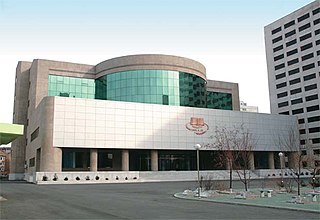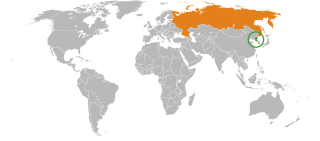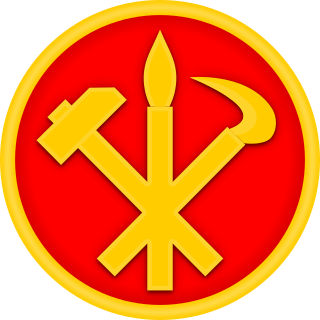
Economic sanctions are commercial and financial penalties applied by states or institutions against states, groups, or individuals. Economic sanctions are a form of coercion that attempts to get an actor to change its behavior through disruption in economic exchange. Sanctions can be intended to compel or deterrence.

Kim Chaek University of Technology (Korean: 김책공업종합대학) is a university in North Korea, on the banks of the Taedong River in Pyongyang. It is named after General Kim Chaek.

The Grand Mass Gymnastics and Artistic Performance Arirang, also known as the Arirang Mass Games, or the Arirang Festival is a mass gymnastics and artistic festival held in the Rungrado May Day Stadium in Pyongyang, North Korea. The games usually take place in August or September. The Arirang Mass Games were held annually between 2002 and 2013, with the exception of 2006. After a five-year hiatus, Mass Games returned for a performance entitled 'The Glorious Country' in 2018.

United Nations Security Council Resolution 1695, adopted unanimously on July 15, 2006, after recalling resolutions 825 (1993) and 1540 (2004) concerning North Korea and the non-proliferation of weapons of mass destruction respectively, the Council banned the selling of material that would further the ability of the Democratic People's Republic of Korea to bolster its ballistic missiles programme.

United Nations Security Council Resolution 1718 was adopted unanimously by the United Nations Security Council on October 14, 2006. The resolution, passed under Chapter VII, Article 41, of the UN Charter, imposes a series of economic and commercial sanctions on the Democratic People's Republic of Korea in the aftermath of that nation's claimed nuclear test of October 9, 2006.

North Korea–Russia relations are the bilateral relations between Russia and North Korea. The Soviet Union was the first to recognize North Korea on October 12, 1948, shortly after the proclamation, as the sole legitimate authority in all of Korea. The Soviet Union supported North Korea during the Korean War. North Korea was founded as part of the Communist bloc, and received major Soviet military and political support. The comprehensive personality cult around North Korea's ruling family was heavily influenced by Stalinism. China and the Soviet Union competed for influence in North Korea during the Sino-Soviet split in the 1960s, as North Korea tried to maintain good relations with both countries.
Room 39 is a secretive North Korean party organization that seeks ways to maintain the foreign currency slush fund for the country's leaders.

United Nations Security Council Resolution 1874 was adopted unanimously by the United Nations Security Council on 12 June 2009. The resolution, passed under Chapter VII, Article 41, of the UN Charter, imposes further economic and commercial sanctions on the Democratic People's Republic of Korea and encourages UN member states to search North Korean cargo, in the aftermath of an underground nuclear test conducted on 25 May 2009.
Ryongsong Residence, also called Residence No. 55, is the main official residence of North Korean supreme leader Kim Jong Un and first lady Ri Sol Ju.
The Foreign Trade Bank of the Democratic People's Republic of Korea is North Korea's primary foreign exchange bank, and is owned and run by the North Korean government.

The Organization and Guidance Department (OGD), created in 1946, is a department of the Central Committee of the Workers' Party of Korea (WPK), the ruling party of North Korea. Its central responsibility is to implement the directives and teachings of the Suryeongs [Great Leaders], Kim Il Sung and Kim Jong Il. The department was initially a department within the WPK General Affairs Department, but eventually spun off and was established at the 3rd Plenary Session of the 2nd Central Committee as the Organization Committee.

The alleged illicit activities of the North Korean state include manufacture and sale of illegal drugs, the manufacture and sale of counterfeit consumer goods, human trafficking, arms trafficking, wildlife trafficking, counterfeiting currency, terrorism, and other areas. It is alleged many of these activities are undertaken at the direction and under the control of the North Korean government and the ruling Workers' Party of Korea, with their proceeds going towards advancing the country's nuclear and conventional arms production, funding the lifestyles of the country's elite, and propping up the North Korean economy.
Korea Mining Development Trading Corporation is North Korea’s primary arms dealer, and main exporter of goods and equipment related to ballistic missiles and conventional weapons.
Nigel Cowie is a British banker, who lived in North Korea for two decades from 1995.
Kim Chol-sam is a North Korean banker, the treasurer of Daedong Credit Bank (DCB).
Ri Man-gon is North Korean politician who served as Director of the Organization and Guidance Department and Vice Chairman of the Workers' Party of Korea from 2019 to 2020. He was formerly a member of the Politburo of the Workers' Party of Korea and director of munitions and military. He was a "supervisor of the department for the nuclear and missile development".
A number of countries and international bodies have imposed international sanctions against North Korea. Currently, many sanctions are concerned with North Korea's nuclear weapons program and were imposed after its first nuclear test in 2006.
Tanchon Commercial Bank is a North Korean bank. It was originally opened in August 1986.

Jo Yong-won is a North Korean politician and a deputy chief of the Workers' Party of Korea (WPK)'s Secretariat of General Secretary Kim Jong Un. He was a vice director of the WPK Organization and Guidance Department (OGD). Jo was also a full member of the 7th Central Committee of the WPK since it was elected at the 7th Congress of the WPK in May 2016. Jo has been a member of the Presidium of the Politburo, and a secretary of the Secretariat of the WPK since it was elected at the 8th WPK Central Committee in January 2021. Jo appears to serve as the First Secretary of the Workers’ Party of Korea making him formally the principal day-to-day leader of the party second only to Kim Jong Un.
Jong Kyong-thaek is a North Korean politician. He served as the Minister of State Security from 2018 to 2022, a member of the Central Military Commission of the Workers' Party of Korea (WPK), an alternate member of the Politburo of the WPK, and a member of the State Affairs Commission of North Korea.








